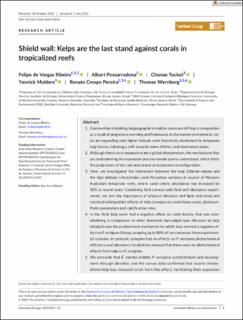| dc.contributor.author | de Vargas Ribeiro, Felipe | |
| dc.contributor.author | Pessarodona, Albert | |
| dc.contributor.author | Tucket, Chenae | |
| dc.contributor.author | Mulders, Yannick | |
| dc.contributor.author | Pereira, Renato Crespo | |
| dc.contributor.author | Wernberg, Thomas | |
| dc.date.accessioned | 2022-09-20T08:14:15Z | |
| dc.date.available | 2022-09-20T08:14:15Z | |
| dc.date.created | 2022-08-15T15:22:36Z | |
| dc.date.issued | 2022 | |
| dc.identifier.citation | Functional Ecology. 2022, . | en_US |
| dc.identifier.issn | 0269-8463 | |
| dc.identifier.uri | https://hdl.handle.net/11250/3019041 | |
| dc.description.abstract | Communities inhabiting biogeographic transition zones are shifting in composition as a result of progressive warming and heatwaves. In the marine environment, corals are expanding onto higher latitude reefs historically dominated by temperate kelp forests, initiating a shift towards warm affinity coral-dominated states. | en_US |
| dc.language.iso | eng | en_US |
| dc.title | Shield wall: Kelps are the last stand against corals in tropicalized reefs | en_US |
| dc.title.alternative | Shield wall: Kelps are the last stand against corals in tropicalized reefs | en_US |
| dc.type | Peer reviewed | en_US |
| dc.type | Journal article | en_US |
| dc.description.version | publishedVersion | en_US |
| dc.source.pagenumber | 0 | en_US |
| dc.source.journal | Functional Ecology | en_US |
| dc.identifier.doi | 10.1111/1365-2435.14141 | |
| dc.identifier.cristin | 2043147 | |
| cristin.ispublished | true | |
| cristin.fulltext | original | |
| cristin.qualitycode | 2 | |
